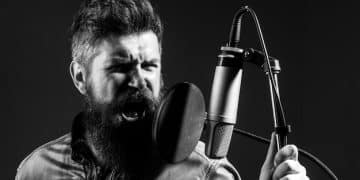Podcast Interview Prep: Secure More Media Mentions

Mastering podcast interview prep is essential for securing more media mentions, providing a unique platform to effectively communicate your message and expand your reach.
In today’s dynamic media landscape, securing meaningful media mentions requires more than just generic outreach; it demands strategic preparation, especially when it comes to podcast interviews. Effective podcast interview prep is not merely about reciting talking points; it’s about crafting a compelling narrative, building rapport, and delivering value that resonates with a specific audience, ultimately amplifying your message and extending your reach.
The Foundational Pillars of Effective Podcast Interview Preparation
Before diving into the specifics, understanding the bedrock principles of preparing for a podcast interview is paramount. It’s not just about showing up; it’s about strategic engagement. Every host has a unique style and every audience has distinct expectations. Meticulous preparation ensures you can adapt and deliver.
One common pitfall is the failure to thoroughly research the podcast and its host. This goes beyond listening to just one episode; it involves understanding their content themes, interview style, and audience demographics. A tailored approach not only impresses the host but also ensures your message hits home with their listeners.
Understanding Your Audience and the Podcast’s Niche
Every podcast cultivates a distinct audience, and successful guesting hinges on recognizing and speaking to that specific demographic. This involves delving deep into the podcast’s past episodes, noting common themes, recurring questions, and the type of language used by the host and previous guests.
- Audience demographics: Age, interests, professional background.
- Content themes: Recurring topics, host’s perspective, common insights.
- Engagement style: Q&A format, conversational flow, debate.
Neglecting this crucial step can lead to a disjointed interview, where your insights, no matter how valuable, miss their intended mark. Tailoring your message ensures resonance and memorability.
Researching the Host and Previous Episodes
Beyond the audience, the host themselves is a critical component of your research. What are their interests? Do they have a particular interviewing style? Observing how they interact with other guests provides invaluable insights into how you can best engage with them.
Analyzing previous episodes can also reveal common interview structures, typical question patterns, and even specific phrases or anecdotes the host frequently uses. This detailed understanding allows you to anticipate questions and seamlessly integrate your talking points into their established flow.
Investing time in this preliminary research builds a strong foundation. It moves you from merely being “a guest” to being “the ideal guest,” someone who understands the show’s dynamics and can contribute meaningfully to its ongoing narrative. This level of dedication translates directly into a more impactful interview and, consequently, greater media visibility.
Crafting Your Core Message and Key Takeaways
The essence of a compelling podcast interview lies in clearly articulating your core message. Without a concise, memorable message, even the most eloquent speaker can get lost in meandering discussions. This step involves refining your unique proposition and ensuring it aligns seamlessly with the podcast’s theme.
Your goal isn’t just to share information; it’s to provide actionable insights or a fresh perspective that listeners can genuinely benefit from. This requires distilling complex ideas into digestible soundbites and ensuring every talking point reinforces your central theme.
Defining Your Unique Value Proposition
Before stepping into the recording booth, identify what makes you, or your topic, uniquely valuable to that specific podcast’s audience. What specific problem do you solve, or what unique insight do you offer that listeners won’t easily find elsewhere? This isn’t about bragging; it’s about showcasing genuine utility.
- Identify target listener pain points.
- Pinpoint your distinctive expertise or experience.
- Frame your solutions or insights in an accessible manner.
A well-defined value proposition ensures that your interview isn’t just informative, but immediately relevant and compelling. It’s the magnet that draws listeners in and encourages them to take action or explore further.
Developing Memorable Soundbites and Anecdotes
In the rapid-fire world of podcasts, memorable moments are often encapsulated in concise, impactful statements. Develop “soundbites” – short, pithy phrases that convey your core message – that are easy to remember and share. These can be statistics, surprising facts, or quotable insights.
Equally important are personal anecdotes. Storytelling is a powerful tool for connection and retention. A well-placed, relevant anecdote can illustrate a complex point, make your message more relatable, and inject personality into your interview. Ensure your stories have a clear beginning, middle, and end, and directly support your main talking points.
Practicing these soundbites and anecdotes ensures they sound natural and impactful during the interview. The aim is not to sound rehearsed, but to be prepared to deliver your most potent insights with clarity and confidence, leaving a lasting impression on listeners.

Strategic Question Anticipation and Practice Runs
Anticipating potential questions is a cornerstone of effective podcast interview prep. It shifts the dynamic from reactive to proactive, allowing you to not only answer questions but also to strategically guide the conversation towards your key messages. This involves more than just guessing; it requires a systematic approach to question mapping.
Beyond anticipation, practice is indispensable. Rehearsing your answers, even if just mentally, builds confidence and refines your delivery. Role-playing with a colleague or friend can highlight areas where your responses might be unclear or where you miss opportunities to weave in your value proposition.
Anticipating Common and Specific Questions
While every interview is unique, certain common questions tend to arise in most podcast settings. These include inquiries about your background, the genesis of your work, and broader industry trends. Prepare concise, engaging answers for these standard queries.
However, truly effective preparation involves anticipating questions specific to the host’s style and the podcast’s niche. Based on your research of previous episodes, consider:
- What controversial or nuanced aspects of your topic might interest the host?
- Are there particular challenges or current events they often discuss?
- What follow-up questions might arise from your initial talking points?
Having a mental map of these potential questions allows you to seamlessly bridge from the host’s query to your pre-prepared insightful responses, maintaining control of the narrative without appearing evasive.
Conducting Mock Interviews for Refinement
Reading through your notes is one thing; articulating them under pressure is another. Conducting mock interviews is a powerful way to simulate the actual experience and identify areas for improvement. Ask a trusted colleague or friend to play the role of the host, encouraging them to ask challenging or unexpected questions.
During these practice sessions, pay attention to:
- Your speaking pace and clarity.
- Avoiding filler words or rambling.
- Seamless transitions between points.
- Your ability to pivot back to your core message if the conversation strays.
Recording these mock sessions for self-review can provide invaluable feedback on verbal tics, tone, and overall presence. The more you practice, the more natural and confident your responses will become, leading to a more polished and impactful performance on the actual podcast.
Optimizing Your Environment and Technical Setup
The best content can be undermined by poor audio quality or distracting visuals. Technical preparation is just as critical as content preparation. A professional sound and visual setup conveys respect for the host and their audience, and ensures your message is delivered without hinderance.
This includes everything from selecting a quiet space to testing your microphone and internet connection. Overlooking these seemingly minor details can have a significant impact on the perceived quality of your interview and, by extension, your professional image.
Ensuring Optimal Audio Quality
Audio is king in the podcasting world. A high-quality microphone is a non-negotiable investment for anyone serious about being a recurring media guest. USB microphones, such as the Blue Yeti or Rode NT-USB, offer excellent sound without requiring complex audio interfaces.
Beyond the hardware, the recording environment plays a crucial role:
- Choose a quiet room: Avoid areas with ambient noise like traffic, air conditioning, or loud neighbors.
- Reduce echo: Soft furnishings, curtains, and even bookshelves can absorb sound and prevent echo.
- Test thoroughly: Record a short clip before the interview and listen back to identify any unexpected noises or distortions.
Clear, crisp audio ensures that every word you utter is heard, preventing listener fatigue and enhancing the overall professionalism of your appearance.
Stable Internet Connection and Video Considerations
A stable internet connection is paramount for remote interviews, preventing frustrating dropouts or lag. Whenever possible, use a wired Ethernet connection rather than Wi-Fi, which can be less reliable.
If the interview involves video:
- Good lighting: Natural light from a window in front of you is ideal. Avoid backlighting.
- Clean background: A tidy, professional-looking background minimizes distractions.
- Camera angle: Position your camera at eye level for a more engaging interaction.
- Minimal distractions: Close unnecessary tabs, silence notifications, and inform others in your household to avoid interruptions.
Investing time in these technical aspects prior to your interview demonstrates professionalism and ensures that the focus remains on your valuable insights, not on technical glitches.
Post-Interview Engagement and Follow-Up
Your responsibilities don’t end when the recording stops. Post-interview engagement is a critical, yet often overlooked, part of securing more media mentions and building lasting relationships. This phase is about leveraging the interview’s potential and nurturing connections.
Proper follow-up can significantly amplify the reach of your interview, turn a one-off appearance into a recurring opportunity, and strengthen your professional network. It’s an extension of your guesting strategy, demonstrating appreciation and proactive collaboration.
Thanking the Host and Sharing the Episode
A prompt, personalized thank-you note to the host and production team is not just good etiquette; it reinforces a positive relationship. Mention specific aspects of the conversation you enjoyed or learned from. This gesture often sets you apart.
Once the episode is live, actively sharing it across your own platforms is crucial. This helps the host promote their content and exposes your message to a wider audience.
- Social media promotion: Share clips, quotes, and direct links to the episode.
- Newsletter integration: Feature the interview in your email newsletters.
- Website integration: Embed the episode on your personal or company website.
By actively participating in the promotion, you become an asset to the podcast, increasing the likelihood of future invitations and strengthening your reputation as a valuable media contributor.
Leveraging the Interview for Future Opportunities
An interview is not just a standalone event; it’s a piece of content that can be repurposed and leveraged. Consider dissecting the conversation for key insights, turning them into blog posts, articles, or even micro-content for social media.
Beyond content, use the interview as a case study in your outreach efforts for other media opportunities. Highlight the positive reception and the value you provided. Frame your pitches around the success of your podcast appearance, demonstrating your ability to engage audiences and deliver compelling content.
Maintaining an ongoing relationship with hosts and producers, even months after an interview, can also lead to referrals or being top-of-mind for future themed episodes. This strategic, long-term approach to post-interview engagement turns every appearance into a stepping stone for broader media recognition.
Building a Media-Savvy Personal Brand
Securing more media mentions is not just about individual interviews; it’s about cultivating a consistent, media-ready personal brand. This involves proactively positioning yourself as an expert, making yourself easily discoverable, and demonstrating a readiness to engage with diverse media platforms.
A strong personal brand acts as an accelerant for media opportunities. It signals to producers and journalists that you are a reliable, authoritative, and engaging source, making you an attractive option for their content needs. This goes beyond just having expertise; it’s about making that expertise accessible and appealing.
Creating an Online Media Kit or Speaker’s Page
To streamline the process for producers and journalists, assemble a comprehensive online media kit or speaker’s page. This centralized resource should contain everything a media professional might need to feature you:
- Professional bio: Concise, engaging, and tailored for media use.
- High-resolution headshots: Diverse options, suitable for various publications.
- Key speaking topics: A clear list of your areas of expertise.
- Previous media appearances: Links to past interviews, articles, or TV segments.
- Testimonials: Quotes from hosts or show producers.
- Contact information: Clear and immediate channels for outreach.
An easily accessible media kit demonstrates your professionalism and preparedness, simplifying the vetting process for potential media opportunities and making you a more attractive prospect.
Networking with Hosts, Producers, and Journalists
Relationships are the lifeblood of media opportunities. Actively networking within the media landscape can open doors that traditional outreach might not. This involves a strategic and genuine approach to connecting with decision-makers.
- Attend industry events: Conferences, webinars, and online forums often attract media professionals.
- Engage on social media: Follow and interact with hosts, producers, and journalists on platforms like LinkedIn and X (formerly Twitter). Share their content, offer respectful insights, and build genuine rapport.
- Personalized outreach: When reaching out, reference their work specifically, connecting it to your expertise in a thoughtful, non-self-promotional way.
Building these connections over time ensures that when a relevant opportunity arises, you are considered a known and trusted asset rather than a cold contact. A robust network significantly amplifies your chances of securing desirable media mentions.
Advanced Techniques for Maximizing Impact
Moving beyond the fundamentals, there are advanced strategies that can significantly elevate your podcast appearances from merely informative to truly impactful and memorable. These techniques focus on deeper engagement, content repurposing, and strategic partnership, pushing the boundaries of traditional guesting.
The goal here is not just to appear on a podcast, but to create a ripple effect, turning a single interview into a prolonged period of increased visibility and brand association. This requires forethought, creativity, and an understanding of media ecosystems.
Offering Exclusive Content or Resources
To provide extra value to the podcast’s audience and enhance the stickiness of your message, consider offering exclusive content or resources related to your interview. This can be a special download, a unique link to a resource page, or a discount code for your services.
- Checklists or templates: Practical tools tied to your expertise.
- Bonus audio/video content: A deeper dive into a specific topic discussed.
- Exclusive mini-course or workshop access: A high-value offer for engaged listeners.
This not only adds immense value for the listener but also provides the podcast host with an attractive incentive to promote your episode more enthusiastically. It creates a win-win scenario, driving engagement for them and qualified leads or deeper interaction for you.
Collaborating on Promotional Efforts with the Host
Beyond simply sharing the episode link, explore deeper collaborative promotional efforts with the podcast host. This can significantly amplify the reach and impact of your appearance. Think of the interview as a joint venture, where both parties benefit from combined promotion.
Propose ideas such as:
- Joint social media campaigns: Synchronized posts, live Q&A sessions.
- Cross-promotion in newsletters: Each promoting the other’s relevant content.
- Guest blog posts: Writing a companion piece for the podcast’s website.
- Creating short video clips: Snippets of the interview for social platforms like TikTok or Instagram.
By working together, you can tap into each other’s networks and leverage different content formats, driving more traffic to the episode and enhancing both your and the podcast’s visibility. This proactive collaboration builds stronger relationships and maximizes mutual benefit.

Maintaining Momentum and Building Long-Term Relationships
The quest for media mentions is an ongoing journey, not a singular destination. Sustaining momentum from individual podcast appearances and cultivating enduring relationships are key to consistent visibility. This phase focuses on turning one-off opportunities into a continuous stream of media presence.
It’s about being consistently valuable, maintaining open lines of communication, and always looking for ways to provide insightful contributions, ensuring that you remain top-of-mind for media professionals seeking expert commentary.
Regularly pitching New Angles or Topics
Don’t wait for hosts to reach out to you. Proactively pitch new angles or fresh topics that align with the podcast’s direction and current events. This demonstrates your continued relevance and initiative.
- Monitor news and industry trends: Connect your expertise to timely developments.
- Propose follow-up episodes: If a previous interview was popular, suggest a deeper dive into a specific aspect.
- Brainstorm unique perspectives: Offer a challenging or novel take on a common topic.
Well-crafted, timely pitches showcase your ability to be a consistent source of valuable content, making you a go-to expert for recurrent media commentary.
Nurturing Relationships with Media Contacts
Successful media relations are built on genuine, long-term connections. Beyond the immediate interview, dedicate time to nurturing your relationships with hosts, producers, and journalists. This involves more than just periodic check-ins.
- Personalized communications: Share relevant articles or insights that you think they’d find interesting, without expectation.
- Offer assistance: Be available to provide quick quotes or background information for their other projects.
- Attend their events: If they host webinars or live sessions, show support where appropriate.
By investing in these relationships, you solidify your position not just as a content provider, but as a valued colleague and trusted resource within their professional network, paving the way for sustained media visibility.
| Key Area | Brief Description |
|---|---|
| 📚 Research & Strategy | Thoroughly investigate podcast niche, host style, and audience to tailor messages effectively. |
| ✉️ Message Crafting | Define unique value, develop memorable soundbites, and prepare engaging anecdotes. |
| 🎙️ Technical Setup | Ensure optimal audio quality and a stable internet connection for seamless delivery. |
| 🤝 Relationship Building | Engage post-interview, maintain network, and offer future content ideas to ensure ongoing opportunities. |
Frequently Asked Questions About Podcast Interviews
Researching the podcast and host is very crucial. It enables you to tailor your message, anticipate questions, and understand the audience’s interests. This deep dive ensures your answers resonate and helps you avoid generic responses, leading to a much more impactful and memorable appearance for both the host and listeners.
The best way to practice is by conducting mock interviews. Have a friend or colleague play the host and ask challenging questions. Record these sessions to review your speaking pace, clarity, and how well you integrate your key messages. This helps refine your delivery and builds confidence.
For remote interviews, a quality USB microphone is essential for clear audio. Also, ensure a stable internet connection, preferably wired, to avoid disruptions. Good lighting and a clean, non-distracting background are important if the interview involves video, enhancing your professional presentation and message delivery.
After your interview, share it widely across your platforms. Repurpose key insights into blog posts or social media content. Use the successful appearance as proof of your expertise when pitching to other media outlets. Maintaining relationships with hosts can also lead to referrals or future invitations, amplifying your reach.
Yes, offering exclusive content like a unique download, special resource link, or discount code can significantly enhance listener engagement. It provides additional value beyond the interview itself, incentivizes the host to promote your episode more, and helps you directly capture new leads or build relationships with the audience.
Conclusion
Mastering podcast interview prep is undoubtedly a strategic imperative for anyone looking to amplify their voice and secure consistent media presence. From in-depth research and meticulous message crafting to technical optimization and proactive post-interview engagement, each step contributes to a highly impactful appearance. By treating every podcast opportunity as a chance to forge connections and deliver exceptional value, you not only enhance your immediate visibility but also build a sustainable pipeline for future media mentions, positioning yourself as a sought-after expert in your field. This holistic approach transforms mere appearances into powerful brand-building moments, significantly extending your influence and reach.





